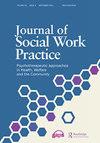Reflective practice editorial
IF 1.4
4区 社会学
Q3 SOCIAL WORK
引用次数: 0
Abstract
Reflective practice is a well-established, but not uncomplicated or uncontested, feature of 21st Century professional activity. Familiar to practitioners in social work, social care, teaching and health-related professions, reflective practice is widely recognised as ‘a good thing’. What it exactly looks and feels like for those practising it or on the receiving end of it, however, is less well understood. In recent years, the dominance of the socio-political landscape by New Public Management and technical-rational responses to the complex, multi-faceted, affective and emotional circumstances of people’s lives, has reinforced the need for reflective skills and practices. Due to the current socially disturbing circumstances – the war in Ukraine, the global pandemic and the climate crisis – that challenge us existentially, evoke powerful emotional responses and attack our capacity to think, the need for reflective practice is, perhaps, greater than ever. It has become very apparent, as a result of the impact of the pandemic on working practices, for example, how we feel the need to be constantly available to everyone’s every demand has heightened significantly. Our online meetings have meant we now move from one space at 10.59 am to another at 11.00 am, without even taking a pause to breathe. In a similar vein, social workers working from home talk about how they take their phones with them everywhere, even to the toilet, for fear of someone thinking they are not working responsibly. This Special Issue of the Journal of Social Work Practice provides a vital thinking space for the debates and dilemmas surrounding reflective practice to be aired and explored, at both the intellectual and emotional levels. Of particular concern is our commitment to ensuring we publish in ways that reflect the diversity of our world, our discipline and our profession. In her book Sensuous Knowledge: A Black Feminist Approach for Everyone, Minna Salami respectfully invites us all to engage inclusively and joyfully in reconfiguring our epistemological mindsets. For Salami, this involves a commitment to breaking down entrenched patterns of Europatriarchal thinking, and especially binary perspectives which privilege rational and intellectual understanding over understanding coming from our emotions and our hearts. This is our intention and commitment too. Three of the papers in this issue specifically focus on exploring how diverse cultural perspectives and indigenous knowledge can offer new approaches to reflective practice. Bindi Bennett and her colleagues from Australia outline a practice framework for teaching reflexive practice in social work education using an approach that is inclusive and values diverse perspectives from the Black, Indigenous, and other People of Color (BIPOC) and lesbian, gay, bisexual, transgender/gender diverse, and queer+ (LGBTQ+) communities. Seeking to engage with Aboriginal and Torres Strait Islander and nonIndigenous people, this culturally responsive framework promotes dialogue, compassion and allyship with people from marginalised backgrounds and draws on indigenous knowledge, values, and beliefs to help establish more inclusive reflective practices. JOURNAL OF SOCIAL WORK PRACTICE 2022, VOL. 36, NO. 2, 131–133 https://doi.org/10.1080/02650533.2022.2066904反思性实践社论
反思性实践是21世纪职业活动的一个公认但并非简单或无争议的特点。对于社会工作、社会护理、教学和健康相关专业的从业者来说,反思性实践被广泛认为是一件“好事”。然而,对于那些练习它或接受它的人来说,它到底是什么样子和感觉,还不太清楚。近年来,新公共管理在社会政治格局中的主导地位,以及对人们生活中复杂、多方面、情感和情感环境的技术理性反应,加强了对反思技能和实践的需求。由于当前令人不安的社会环境——乌克兰战争、全球疫情和气候危机——对我们的生存提出了挑战,引发了强烈的情绪反应,并攻击了我们的思考能力,反思实践的必要性可能比以往任何时候都更大。例如,由于疫情对工作实践的影响,我们觉得需要不断满足每个人的每一个需求,这一点变得非常明显。我们的在线会议意味着我们现在从上午10点59分的一个空间转移到上午11点的另一个空间,甚至不需要暂停呼吸。同样,在家工作的社会工作者也会谈论他们如何带着手机到处走,甚至去厕所,因为他们害怕有人认为他们工作不负责任。《社会工作实践杂志》的这期特刊为围绕反思实践的辩论和困境提供了一个重要的思考空间,以便在智力和情感层面上进行传播和探索。特别令人关切的是,我们致力于确保我们的出版方式反映我们世界、我们的学科和我们的专业的多样性。米娜·萨拉米在她的《感性知识:每个人的黑人女权主义方法》一书中,恭敬地邀请我们所有人都能包容和快乐地重新配置我们的认识论心态。对萨拉米来说,这涉及到打破根深蒂固的欧洲思维模式,尤其是二元视角,这种视角将理性和智力理解置于来自我们情感和心灵的理解之上。这也是我们的意图和承诺。本期的三篇论文专门探讨了不同的文化视角和土著知识如何为反思实践提供新的方法。来自澳大利亚的Bindi Bennett和她的同事概述了一个实践框架,用于在社会工作教育中教授反射性实践,该方法具有包容性,重视黑人、土著和其他有色人种(BIPOC)以及女同性恋、男同性恋、双性恋、跨性别者/性别多样性和酷儿+(LGBTQ+)社区的不同观点。为了与原住民、托雷斯海峡岛民和非原住民接触,这个具有文化响应能力的框架促进了与边缘化背景的人的对话、同情和结盟,并利用原住民的知识、价值观和信仰,帮助建立更具包容性的反思实践。《2022年社会工作实践杂志》,第36卷,第2期,131-133https://doi.org/10.1080/02650533.2022.2066904
本文章由计算机程序翻译,如有差异,请以英文原文为准。
求助全文
约1分钟内获得全文
求助全文
来源期刊

Journal of Social Work Practice
SOCIAL WORK-
CiteScore
2.50
自引率
7.10%
发文量
39
期刊介绍:
The Journal of Social Work Practice publishes high quality refereed articles devoted to the exploration and analysis of practice in social welfare and allied health professions from psychodynamic and systemic perspectives. This includes counselling, social care planning, education and training, research, institutional life, management and organisation or policy-making. Articles are also welcome that critically examine the psychodynamic tradition in the light of other theoretical orientations or explanatory systems. The Journal of Social Work Practice is committed to a policy of equal opportunities and actively strives to foster all forms of intercultural dialogue and debate.
 求助内容:
求助内容: 应助结果提醒方式:
应助结果提醒方式:


